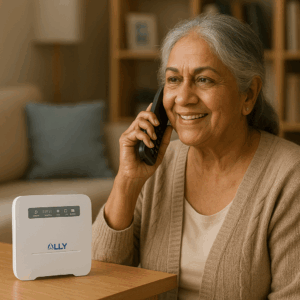If you love traveling in your RV, staying connected on the road is more than a luxury—it’s a necessity. Whether you’re working remotely, streaming your favorite shows, or keeping in touch with family, reliable internet makes RV life smoother. But the big question remains: RV satellite vs cellular internet—which is better?
In this guide, we’ll break down the pros and cons of each, compare real-world performance, and help you decide the best option for your travel style.
Why Internet Matters for RV Travelers
Modern RVers rely on internet for more than browsing. With more people working on the road, connectivity is critical. A good connection supports:
-
Remote work: Zoom meetings, file uploads, and emails.
-
Navigation: Real-time traffic and weather updates.
-
Entertainment: Streaming Netflix or YouTube during downtime.
-
Safety: Emergency alerts and communication.
Without dependable internet, life on the road can feel stressful and disconnected.
What Is RV Satellite Internet?
Satellite RV WiFi uses satellites orbiting Earth to deliver internet. A dish or antenna mounted on your RV communicates with these satellites. Services like Starlink RV have made satellite internet more accessible for travelers.
Pros:
-
Works in remote areas where cell towers don’t exist.
-
Provides nationwide coverage, including rural campsites.
-
Useful for off-grid living.
Cons:
-
Higher equipment and setup costs.
-
Latency can affect gaming and video calls.
-
Requires a clear view of the sky—trees or mountains can block signals.
What Is RV Cellular Internet?
Cellular internet for RVs relies on nearby 4G or 5G towers. You connect using a mobile hotspot, router, or SIM card plan.
Pros:
-
Faster speeds in urban and suburban areas.
-
Affordable equipment with quick setup.
-
Great for streaming, calls, and daily use.
Cons:
-
Coverage gaps in rural or mountainous regions.
-
Data caps may limit heavy use.
-
Speeds vary depending on tower congestion.
Explore wireless internet for RVs if you’re considering cellular-based solutions.
RV Satellite vs Cellular Internet: Side-by-Side Comparison
| Feature | Satellite RV WiFi | RV 5G Internet / Cellular |
|---|---|---|
| Coverage | Works almost anywhere with sky view | Strong in cities, weak in rural zones |
| Speed | 50–250 Mbps (higher latency) | 25–300 Mbps (low latency) |
| Setup | Requires dish/antenna | Easy with hotspot/router |
| Cost | Higher upfront + monthly fees | More affordable monthly plans |
| Best For | Off-grid adventurers, remote camps | Travelers near highways, cities, or suburbs |
When to Choose Satellite Internet for RVs
Satellite internet is best if:
-
You spend most of your time off-grid.
-
You camp in remote national parks or deserts.
-
You’re less concerned about latency and more about availability.
According to FCC reports, satellite services continue to expand coverage, making them a strong option for rural RV travelers.
When to Choose Cellular Internet for RVs
Cellular is better if:
-
You travel along highways or near cities.
-
You need stable speeds for video calls.
-
You prefer affordable and easy setup.
With RV 5G internet, speeds now rival home broadband in many areas. Providers like T-Mobile and Verizon continue to improve tower networks across California and beyond.
Hotspot Comparison: A Flexible Option
Many RVers use mobile hotspots to bridge the gap between cellular and satellite. Hotspots allow multiple devices to connect and are portable. They’re ideal for families traveling together or remote workers who need consistent connectivity.
Tip: Combine a cellular hotspot with satellite backup for maximum coverage. That way, you’re never fully offline.
Cost Considerations
-
Satellite: Expect to spend $500–$700 for equipment and $100–$150 monthly for service.
-
Cellular: Hotspots start under $200, with plans around $50–$90 monthly.
If budget is your top concern, cellular wins. If coverage in the middle of nowhere matters most, satellite may be worth the price.
Ring Planet Communications: Helping RVers Stay Connected
At Ring Planet Communications, we understand the challenges RV travelers face. That’s why we offer tailored solutions—whether you want satellite RV WiFi for off-grid adventures or RV 5G internet for city-to-city travel.
Our plans are built for flexibility, reliability, and ease of use, so you can focus on the journey, not your signal strength.
FAQs About RV Internet
1. Can I use both satellite and cellular internet in my RV?
Yes, many RVers use a hybrid setup for maximum coverage. Satellite works in remote spots, while cellular covers cities and highways.
2. Is RV satellite internet fast enough for streaming?
Yes, services like Starlink can stream HD content, though latency may cause slight buffering.
3. Do hotspots work well for RV travelers?
Hotspots are great if you stay within cellular coverage zones. They’re affordable and easy to carry.
4. What’s the cheapest internet option for RVs?
Cellular plans are generally cheaper than satellite, especially if you don’t need remote coverage.
5. Which is more reliable for work—satellite or cellular?
Cellular internet is usually more reliable for video calls and remote work due to lower latency.
Final Thoughts
So, RV satellite vs cellular internet—which is better? The answer depends on your travel style. If you’re exploring remote wilderness areas, satellite RV WiFi ensures you stay connected even off the grid. If you’re cruising between cities and highways, RV 5G internet or a hotspot plan offers speed and affordability.
For many RVers, the ideal setup is a combination of both. That way, you’ll never have to worry about missing a call, losing navigation, or feeling cut off while enjoying the open road.
With Ring Planet Communications, finding the right balance between satellite and cellular internet has never been easier.






